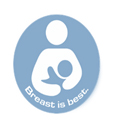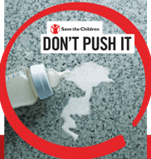
Breastfeeding is the most effective single intervention to reduce child mortality and morbidity and optimise development and health across the life course.[1] For this reason the World Health Organization recommends exclusive breastfeeding for the first six months, and continued breastfeeding until 2 years and beyond.
Yet despite these benefits, exclusive breastfeeding rates in South Africa remain low at 32%,[2] and sales of formula milk have doubled in volume over the past 20 years[3]. This trend is worrying given that one in three infants (37%) live below the food poverty line of R531,[4] and formula milk costs an estimated R375 – R561 a month[5].

Eliminating conflict of interest
The International Code of Marketing of Breastmilk Substitutes (1981) and local Regulation 991 (2012) aim to promote and protect breastfeeding by removing commercial pressures from the infant feeding arena. This includes strict guidelines around industry sponsorship of conferences and scientific meetings, to “ensure that financial support for professionals working in infant and young child health does not create conflicts of interest”[6].
Over the past five years, the Advocacy Committee has documented repeated transgressions of R991 at the Department’s annual Paediatric Refresher Course. Following the lead of the British Medical Journal and Royal College of Paediatrics and Child Health the Committee has called on local academic departments and professional associations to eliminate the inherent conflict of interest with funding from formula milk companies. We are working with the National Department of Health to strengthen reporting mechanisms and enforcement of Regulation 991.
- WHO Webinar: The problem with the formula milk industry: An unhealthy influence on health professionals? 8 September 2022
- Departmental position statement
- Child health, infant formula funding and South African health professionals - eliminating conflict of interest - SAMJ 2019
- Regulation 991
- Guidelines for Industry
- International Code of Marketing of Breastmilk Substitutes
- Infant formula companies are behind the guidelines on milk allergy and their sales are soaring
- Codewatch - violations reporting tool

The new Red Cross breastfeeding room |
Towards a breastfeeding friendly workplace
The Advocacy Committee is also advocating for greater support of breastfeeding women in the workplace. The Basic Conditions of Employment Act guarantees women four months paid maternity leave, but many mothers return to work even earlier in order to earn an income. For this reason, the South African Code of Good Practice on the Protection of Employees during Pregnancy and after the Birth of a Child entitles employees to two 30-minute breaks a day to breastfeed or express milk during the first six months of their child’s life. Yet most women – and their employers – are unaware of these entitlements. Returning to work is strongly associated with breastfeeding cessation and breaks to express or breastfeed should be ongoing to support breastfeeding beyond six months.
Finding a safe space to express at work is challenging, with many women using toilets and broom cupboards or facing the embarrassment of shared office space. The Committee therefore pushed for the establishment of a breastfeeding room and thanks to the combined efforts of hospital management and the Children’s Hospital Trust, staff working at Red Cross Children’s Hospital can now breastfeed or express milk safely in comfort and privacy. It is hoped that these efforts will inspire other institutions– including the Department of Health and University of Cape Town – to proactively support working mothers.
This support should include a range of additional child- and family-friendly measures including flexible working hours, the option to work part-time or work from home, providing affordable child care on site or close to work, and extending maternity leave to 6 months as recommended by the World Health Organisation.
- Breastfeeding breaks: Good for mom. Good for baby. Good for business.
- Supporting breastfeeding in the workplace: A guide for employers and employees
Notes:
[1] Victora, CG et al. (2016) Breastfeeding in the 21st century: epidemiology, mechanisms, and lifelong effect. The Lancet, 387(10017): 475-49
[2] National Department of Health/Statistics South Africa/South African Medical Research Council and ICF. South Africa Demographic and Health Survey 2016. In. Pretoria: National Department of Health; 2019.
[3] Euromonitor International. Global Infant Formula Analysis. A custom report compiled by Euromonitor International for the World Health Organisation. In. London: Euromonitor International; 2015
[4] Sambu W. Analysis of the General Household Survey 2017. Cape Town: Children's Institute, University of Cape Town; 2018.
[5] Calculations by Rina Swart, University of the Western Cape.
[6] World Health Assembly Resolution 49.15 (1996)